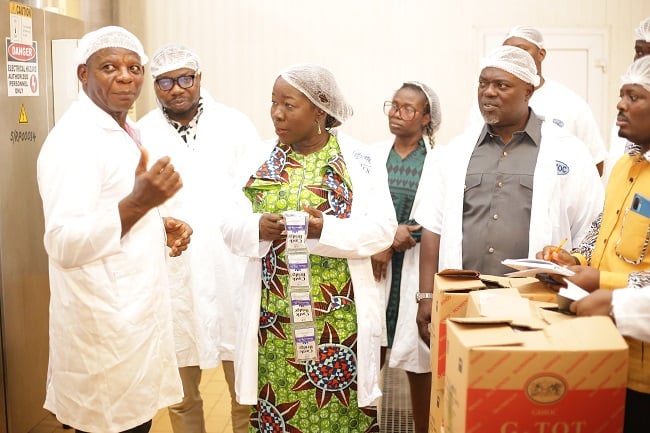The Ghanaian government has embarked on a strategic initiative to revitalize the Ghana Industrial Holding Corporation (GIHOC) distilleries as a cornerstone of its ambitious 24-hour economy program. This initiative aims to significantly expand GIHOC’s operational capacity, generate employment opportunities, and bolster the country’s export potential. The Minister for Trade, Agribusiness and Industry, Mrs. Elizabeth Ofosu-Adjare, underscored the government’s commitment during a recent visit to the GIHOC facility. This visit allowed her to gain a comprehensive understanding of the company’s current operations, identify existing challenges, and explore potential opportunities for growth and development. The revitalization of GIHOC is envisioned as a key driver in achieving the goals of the 24-hour economy initiative, leveraging the company’s established reputation for producing high-quality products.
GIHOC, a state-owned enterprise established in 1958, possesses a rich history and a well-regarded portfolio of products. However, the company has faced significant operational constraints due to accumulated debt and outdated machinery. Despite these challenges, GIHOC maintains a strong workforce, demonstrating the potential for substantial growth with the necessary investment and modernization. The Minister’s visit served as a critical first step in assessing the company’s needs and formulating a comprehensive plan for its revitalization. This plan will focus on addressing the company’s financial challenges, upgrading its aging equipment, and maximizing its human resource capacity.
The government recognizes the strategic importance of supporting GIHOC’s growth trajectory, not only for its domestic impact but also for its potential to contribute to Ghana’s international trade performance. The Minister emphasized the need to retool the corporation to capitalize on the opportunities presented by the African Continental Free Trade Area (AfCFTA) agreement, as well as trade partnerships with the UK and EU markets. This strategic alignment with broader trade initiatives underscores the government’s commitment to leveraging GIHOC’s potential to enhance Ghana’s export capabilities and bolster its economic standing within the global market.
A key component of the revitalization strategy involves implementing a three-shift operational model, a crucial step towards achieving the 24-hour economy vision. This shift in operational structure will necessitate significant investment in modernizing GIHOC’s production lines and ensuring the consistent availability of raw materials. The Minister’s commitment to providing the necessary financial, machinery, and labor support reflects the government’s recognition of GIHOC’s potential to serve as a significant engine for job creation and economic growth within the framework of the 24-hour economy initiative.
During the Minister’s tour, the CEO and Technical Manager of GIHOC provided a detailed overview of the company’s production processes, highlighting the functionalities of each production line and the specific challenges posed by the aging equipment. This insight provided valuable context for understanding the company’s current operational capacity, which is estimated to be operating at only 60-65% due to the limitations of its outdated machinery. The Minister’s direct engagement with the company’s leadership underscores the government’s commitment to a collaborative approach in developing and implementing the revitalization strategy.
The government’s commitment to revitalizing GIHOC represents a strategic investment in the future of Ghana’s economy. By modernizing the company’s infrastructure, strengthening its financial position, and maximizing its human capital, the government aims to transform GIHOC into a driving force within the 24-hour economy framework. This initiative is expected to generate significant employment opportunities, enhance export capabilities, and contribute to the overall growth and diversification of the Ghanaian economy. The successful implementation of this plan will not only revitalize a historical state-owned enterprise but also serve as a model for future investments in strategic industries within Ghana.














